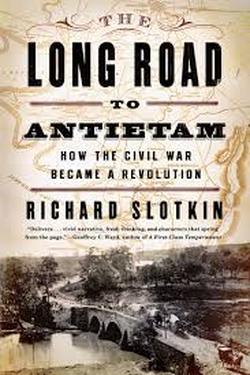
Richard Slotkin
Liveright Publishing Company, 2012, 480 pp. + 33 pp. introduction, $32.95
ISBN: 978-0-87140-411-4
Image courtesy of amazon.com
The Battle of Antietam has been analyzed many times in the history of Civil War writing and many wonder if this conflict, much like Gettysburg, has reached its cap of knowledge on what can be written. Here, in The Long Road to Antietam, Richard Slotkin takes an in depth look not only into the battle itself, but more so the months preceding and the political effects during the aftermath. Throughout his text, he turns the movements of the army along with the changes in the high command into a political narrative which is enthralling to the very last word. The end product is a new work which shines new information on the campaign as a whole and is a welcome addition into the echelon of the Antietam academia.
Richard Slotkin is an award winning historian and author and has written many books not only about the Civil War but about American History as a whole. He is the professor emeritus at Wesleyan University and is the recipient of the Michael Shaara Award for Civil War fiction and his work Abe. His American History Trilogy, Regeneration through Violence, The Fatal Environment and Gunfighter Nation won numerous accolades. He also is well versed on the Battle of the Crater with his fiction work The Crater and his nonfiction work No Quarter.
When readers approach this work, they should realize that the body of the research is not just about the Battle of Antietam, but more of the political ramifications of what happened because of this battle. The political world of the army during the onset of the campaign was brutal in the military not only with General McClellan in command, but the maniacal ways in which he applauded the resignation of General Winfield Scott. Most books state that Scott resigned due to medical reasons, but Slotkin presents information which may change the way people think about that whole event. Throughout the text, McClellan’s actions show how dedicated he was to his soldiers but not so much to his fellow staff and officers. As the armies begin to move and converge on many locations, including a chapter on the Second Battle of Manassas, it becomes clear that anyone wishing to stand in the way of McClellan was about to get steamrolled over. However, it seems that McClellan himself still wanted the approval from his superiors in Washington at every turn. The premise of the work, which is never lost through the text, is that this campaign would thrive on the future Emancipation Proclamation and this idea of the Civil War would then become a revolution of freedom for those in bondage. Slotkin handles this with a great amount of scholarship and academia unmatched in many works on the politics of the war.
The Long Road to Antietam is highly recommended for anyone reading about the Civil War, especially Antietam enthusiasts. This book gives new light to otherwise overlooked segments of the campaign mainly the realm of the political spectrum. The narrative was quite flowing and at some times even page turning due to the very nature of the military and political backstabbing. Mr. Slotkin has once again delivered a fine work to the Civil War audience.
 RSS Feed
RSS Feed
